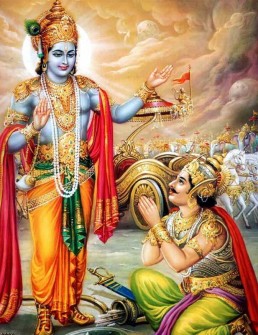
अक्षरब्रह्मयोग
AkṣaraBrahma-yoga - The Imperishable Brahman
The previous chapter concluded by introducing certain technical terms and this one begins with an explanation of those. It then details various spiritual practices undertaken by those who desire to merge with the Supreme. This chapter also describes the two paths followed by the “jiva” after it leaves the body – one being the path of eventual return (to this world) and the other being the path of no return (krama-mukti).
Below are the main themes of Chapter 8:
Verses 1 - 4
Definition of the terms Brahman, adhyātma, karma, adhibūta, adhidaiva and adhiyajña
Verses 5 - 14
The significance and the method of remembering the Lord at the time of death
Verses 15 - 22
Comparison between two types of goals — God and world
Verses 23 - 27
The bright and dark paths
Verses 28
Glory of upāsanā
Gita Chapter 8 - 28 Verses
Chapter 8 - 28 Verses
Commentary by Swami Paramarthananda
Background
Lord Krishna concluded the seventh chapter by gloriying jñāni-bhakta as one who knows Brahman, adhyātma, karma, adhibūta and adhiyajña (i.e., the complete nature of God consisting of parā and aparā-prakṛti). He remembers the God at the time of death also.
With the desire to understand the above new terms, Arjuna asks seven questions to Krishna. The eighth chapter begins with these questions — the first six dealing with the six terms beginning with Brahman and the last one dealing with the thought of a person at the time of death (1, 2).
Lord Krishna answers — Brahman is the imperishable Truth, Adhyātma (or ātman) is the same Brahman behind the individual equipments. Karma refers to all actions which are the cause for the birth of all beings (3).
Adhibhūta is the entire perishable, inert universe. Adhidaiva is the Hiraṇyagarbha who blesses all the organs of of all beings. Adhiyajña is the Lord as the presiding deity of all the actions of the individual (4).
From the 5th verse till the end of this chapter, Lord Krishna elaborately answers the last question i.e., how to remember the Lord even at the time of death.
Whatever be the predominant thought-pattern at the time of death, that determines the place of the rebirth as well as the type of rebirth (6). Hence, if a person yearns for the Lord at the time of death, his rebirth will be conducive for the pursuit of the Lord in which he will naturally be successful (5). [It is said that those who are saguṇa-upāsakas will go to Brahmaloka. They will attain liberation by gaining knowledge from Brahmā, the creator himself. This is called krama-mukti]. But the thought pattern at the time of the death is determined by the predominant thought pattern throughout one’s life. Hence, Krishna asks to remember God all the time so that we will remember Him at the time of death also (7). Though it may appear difficult, one can succeed in this by constant effort and sincere practice (8).
From the 9th to the 13th verse, Krishna describes elaborately the practice of upāsanā at the time of death. One should control the organs of perception as well as action. Then by the skill of yoga-practice, prāṇa has to be withdrawn (through the suṣumnā-nāḍī) to the top of the head between the eyebrows. Then, he should withdraw the mind back to the heart, its source. With such a mind he should meditate on oṅkāra or any chosen deity with all devotion. He attains God who is omniscient, eternal, the ruler, subtler than the subtlest, the sustainer of all, incomprehensible, effulgent, and beyond ignorance. All scriptures talk about Him alone. All dispassionate seekers reach Him alone. All disciplines are for attaining Him alone. He is the ultimate goal of upāsakas.
For a person who is sincerely committed to the practice of meditation of God and whose devotion is undivided, God is easily attainable (14).
Then the Lord compares two types of goals, i.e., God and the world. Nobody can put the end to the cycle of birth by reaching higher lokas (worlds) or by acquiring better bodies. Even Brahmā, the creator, who has the longest duration of life (his day being two thousand catur-yugas) cannot be free from finitude. Then what to talk of all other things and beings which appear during the day of Brahmā and disappear during his night? Hence all the lokas and achievements therein are finite. God is the only eternal and changeless principle who is beyond the unmanifest and manifest creation. He is imperishable and is the supreme goal of life. All beings exist in Him and everything is pervaded by Him. Attaining Him, one does not take rebirth in the mortal world (saṃsāra) (15 to 22).
Thus the Lord established that attainment of God is the highest goal compared to all other achievements. Now Krishna discusses the two paths that lead to the two goals which are subject to nonreturn and return. An upāsaka attains krama-mukti by departing through the bright path (śukla-gati) which is presided over by the deities of fire, day, bright fortnight and uttarāyaṇam. (He goes to Brahmaloka, gains Self-knowledge from Brahmā and becomes liberated.) Ritualists go by the dark-path (Krishna-gati) which is presided over by the deities of smoke, night, dark-fortnight and dakṣiṇāyanam. They come back after enjoying in the heavens (23 to 26).
Since the bright path takes one to God, one should choose that alone. To take to that path one should become an upāsaka. Hence Krishna advises Arjuna to be committed to upāsanā (27).
Concluding the topic, Krishna glorifies the result of upāsanā as superior to all other results gained through all other pursuits. Because, none of them can take one to that goal which the Upasaka attains — the supreme, primal God.
(Upāsanā can take a seeker to Guru and śāstra. Naturally upāsaka becomes jñāni-bhakta. He is liberated in this very life. He has no travel. This aspect (jīvanmukti) was talked in the seventh chapter and will be continued from the ninth chapter.
If upāsanā does not take one to guru and śāstra, he continues to be self-ignorant. He is not liberated in this life. But he travels by the bright-path to Brahmaloka. Instructed by Brahmā, the creator himself, he becomes jñāni-bhakta and is liberated. This is called krama-mukti, which is discussed in the eighth chapter.
Thus upāsanā is useful for jīvanmukti as well as krama-mukti.)
The main topics discussed in this chapter are:
1. Definition of the terms Brahman, adhyātma, karma, adhibūta, adhidaiva and adhiyajña : 1 to 4
2. The significance and the method of remembering the Lord at the time of death: 5 to 14
3. Comparison between two types of goals — God and world: 15 to 22
4. The bright and dark paths: 23 to 27
5. Glory of upāsanā: 28
Since Krishna begins the teaching with Akṣara-brahman this chapter is called Akṣara brahma yoga.

